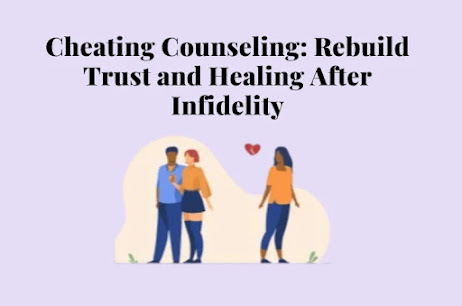Can Counselling help with cheating?
Cheating in a relationship can be an emotionally devastating experience, causing trust issues, pain, and confusion. While it may seem like an insurmountable obstacle, counseling can play a vital role in healing and rebuilding trust in a relationship. In this blog post, we'll explore how counseling can help couples facing the aftermath of Cheating Counseling.
1: Understanding the Impact of Cheating
Infidelity can leave deep emotional scars, affecting both partners in a relationship. The betrayed partner often experiences feelings of betrayal, hurt, and anger, while the partner who cheated may feel guilt, remorse, and confusion. Understanding the impact of cheating is a crucial step in addressing the issue.
2: Couple Counseling
Couple counseling, also known as couples therapy, is a therapeutic approach designed to help couples navigate relationship challenges. It provides a safe and supportive environment for both partners to express their thoughts and emotions openly. A trained therapist facilitates the sessions and guides the couple toward healthier communication and problem-solving.
3: Cheating and Relationships Counseling
Relationship counseling, often including cheating therapy, is an effective way to address the aftermath of infidelity. The counselor helps couples explore the underlying issues that may have led to cheating, such as communication breakdown, unmet needs, or emotional distance.
4: Rebuilding Trust
One of the primary objectives of cheating counseling is to rebuild trust in the relationship. Trust is often the foundation of a healthy partnership, and after cheating, it can be severely damaged. Through counseling, couples can work on rebuilding trust by:
Openly discussing the cheating incident and its impact on both partners.
Identifying and addressing the root causes of the cheating, whether they are emotional or relational.
Developing strategies for rebuilding trust through transparency, honesty, and consistency.
5: Communication and Emotional Healing
Effective communication is critical in the aftermath of cheating. Couples therapy encourages open and honest communication, allowing both partners to express their feelings and needs without judgment. It also provides a platform for emotional healing, enabling the hurt partner to process their emotions and the partner who cheated to express remorse and commitment to change.
6: Learning to Forgive and Move Forward
Forgiveness is a challenging but essential component of healing after cheating. Counseling can help couples understand the concept of forgiveness and work toward it in a healthy way. Forgiveness doesn't mean forgetting, but rather, it's a choice to release the hold that resentment and anger have on a relationship, allowing room for growth and reconciliation.
7: Creating a Stronger Relationship
While healing from cheating is a complex process, it is possible for couples to emerge from counseling with a stronger and healthier relationship. By addressing the issues that led to cheating and working through the aftermath, couples can learn to communicate better, set healthier boundaries, and rekindle the emotional connection that may have been lost.
Conclusion
Counseling, including couple counseling and relationship counseling, can play a pivotal role in helping couples navigate the challenging aftermath of cheating. It offers a safe space for open communication, emotional healing, and the opportunity to rebuild trust and forgiveness.
While the journey may be difficult, many couples emerge from cheating counseling with a deeper understanding of each other and a stronger, more resilient relationship. The path to healing and reconciliation is not always easy, but with professional guidance and a commitment to change, it is possible to move forward and rebuild a healthy, trusting partnership.




Comments
Post a Comment